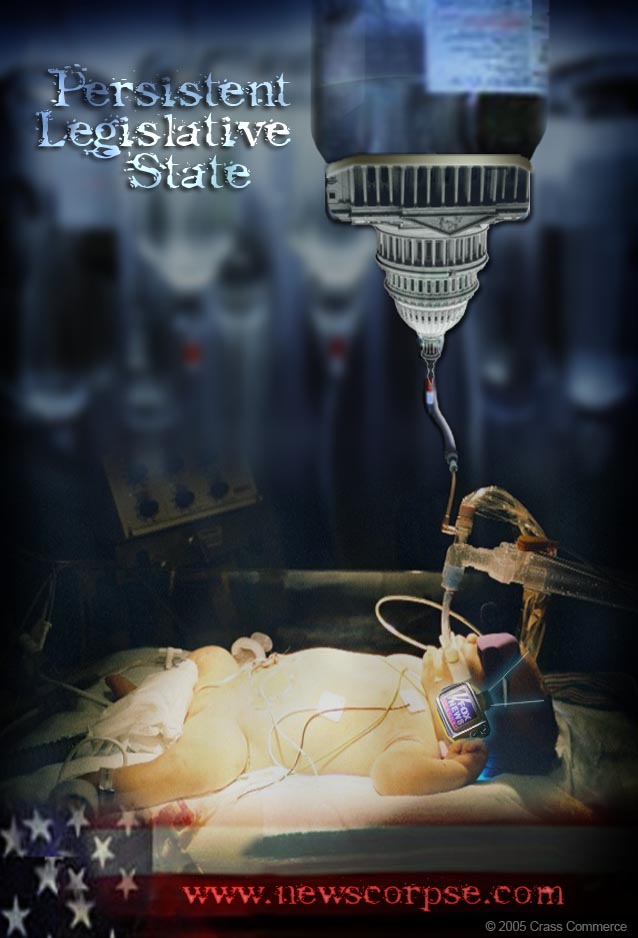Not two weeks after Rupert Murdoch confesses to propagandizing in support of the war in Iraq, he visits the confessional again, this time with regard to his new Fox Business Channel. At a media summit sponsored by McGraw-Hill, Murdoch promised the gathered conferees that:
|
How can any viewer take seriously what they will see on a Fox Business report?
|
“…a Fox channel would be ‘more business-friendly than CNBC.’ That channel ‘leap[s] on every scandal, or what they think is a scandal,’ he said.”
This admission squares nicely with his previous one. It’s obvious he thinks nothing of manipulating news coverage to achieve his ends. Now he feels that the captains of industry, beleaguered by their own corruption, require his defense. The notion that a news network, business or otherwise, should be “friendly” with the subjects they are covering violates every precept of journalism. After making this announcement, how can any viewer take seriously what they will see on a Fox Business report? How will we know if their chumminess leads to deceptively positive stories? How will we know whether they are neglecting signs of budding scandals to protect their buddies? Had they been around when Enron was imploding, FBC would have reported on the tantalizing fare in the company commissary. I, for one, wouldn’t want to invest based on information that came from such a network.
Murdoch’s accusation that CNBC is somehow hostile to business can only be regarded as a paranoid hallucination. Even Business Week derides that viewpoint as:
“a conclusion almost any observer of the channel will find difficult to support.”
Financial news broadcasting is not an easy business to throw together. In 1991, FNN, the Financial News Network, went out of business, selling its assets to CNBC. More recently, Time, Inc.’s CNNfn couldn’t even get off the ground. New York mayor/billionaire, Michael Bloomberg’s network has about half the subscriber base of CNBC. Murdoch will launch with even less than that.
Despite the obstacles, it’s clear why News Corp. would want to enter this market. Although CNBC’s ratings are low, they can charge more for their ads because they deliver an affluent and influential audience that is highly desirable and difficult to obtain. Fox covets both that audience and those advertisers. Their vertical business structure makes it easy for them to package ad campaigns so that they would benefit other Fox properties like their news network, broadcast network, station group, magazines, and newspapers. And since Fox doesn’t care if their reporting is accurate, so long as it’s “friendly,” corporate advertisers might be inclined to favor Fox with their ad dollars. Remember that the cable companies that would carry FBC, and the media companies that might report on them, are also corporations that may want to take advantage of the pro-business slant that Murdoch is offering.
All of this produces some troubling scenarios. A business news network that promises to be friendly with its subjects is essentially serving as the PR arm of the corporations it covers. Consequently, those corporations that want to enjoy this coverage can show their appreciation by buying more ads. Conversely, the ad sales division of the network could pressure advertisers to pony up if they wanted good news to be included in the next broadcast. This sort of relationship is poisonous from the start, yet it is exactly what Murdoch is proposing.
Another problem is that the existing business channels are going to be nervous about the impending competition with Fox. If they keep their heads about them, focus on the quality of their own product, and exhibit some measure of respect for journalistic ethics, then things should work out. But that isn’t how it’s gone down in the past. As Fox News began to challenge its predecessors, they folded like origami sheep. They concluded that the way to compete with Fox was to be more like Fox. That was a disastrous strategy that landed them squarely in Fox’ shadow.
If Murdoch is allowed to pollute this new market with the aberrent philosophy he stated above, it will be a serious blow to the goals of honest, independent journalism. It will mean that they would control the perceptions of our politics, our culture, and our economy. If we want to preserve a free society that values a thoughtful and informed citizenry, we must be relentlessly vigilant. We must keep close company with our representatives and with the agencies that govern the media. We must take steps to be certain that we are knowledgeable and prepared, because…
…this is serious business!
Update from Forbes: [2/18/07] CNBC hasn’t sat back. Spokesman Kevin Goldman answered the criticism coming from Fox Business Channel: “It doesn’t surprise me that our alleged competition is already starting with its usual lies and propaganda.”
Under the threat of competition, they are starting to, finally, tell it like it is.


 Paul R. La Monica, CNNMoney.com editor at large, says that “
Paul R. La Monica, CNNMoney.com editor at large, says that “